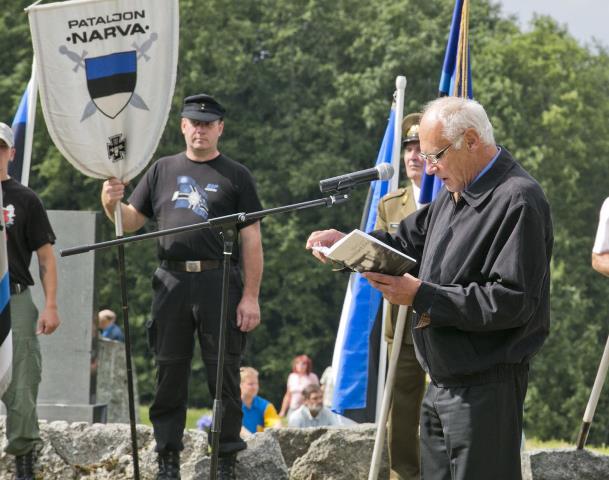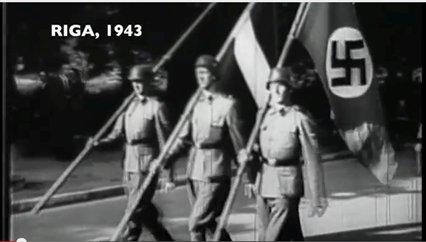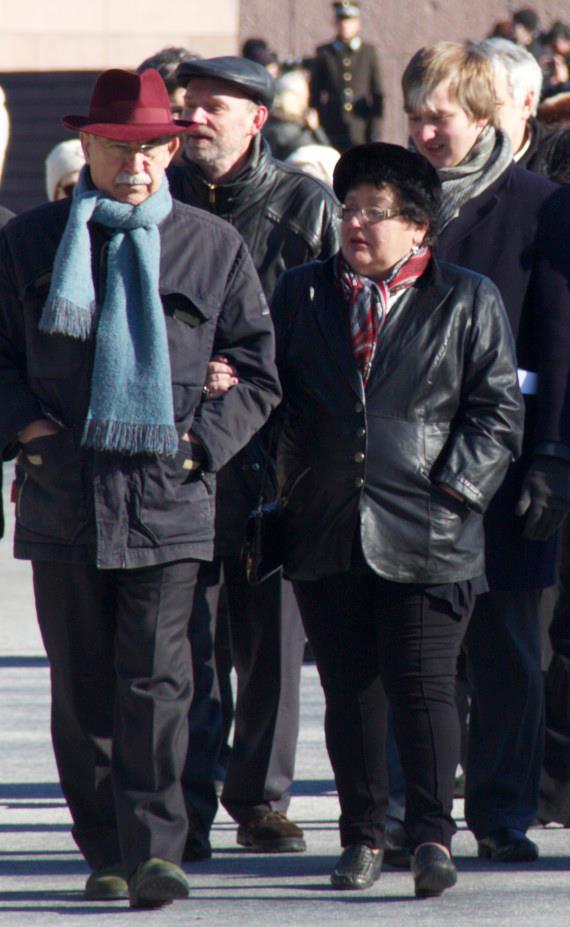The following is the English translation, by Monica Lowenberg, of a letter sent today by German film maker Jürgen Hobrecht to the Latvian ambassador in Berlin.
Dear Mrs. Japina,
Dear Mrs. Japina,
The following, for our readers’ information, is Geoff Vasil’s translation of a 3 February 2014 article that appeared in 15min.lt. Please see the original Lithuanian for the photos referenced herein by their captions in square brackets.
Zabludoff’s Petition Nears the 3,000 Mark
The last Estonian SS veteran to have been awarded the Nazis’ Knight’s Cross, Harald Nugiseks, was buried in Estonia with full military honors on Friday 10 January 2014.
This year’s summer celebration of Estonia’s Hitler-allied Waffen SS was held as scheduled, in the Sinimae hills of eastern Estonia last Saturday, the 27th of July. Images and reports were carried by Postimees and other media.

Source: Postimees
JERUSALEM—The Simon Wiesenthal Center today denounced the commemoration of the “liberation” of the Latvian city of Limbazi, sponsored by the Visu Latvija political party, a member of the ruling coalition in the nation’s parliament in Riga.
Estonian ultranationalists traditionally celebrate Hitler’s victory on the Sinimae Hillls in eastern Estonia annually at the end of July. This year is no exception. The festivities are slated to start on the 27th of July at Sinimae.
As usual, the Estonian government is quietly giving its blessing to the proceedings. Old Estonian Waffen SS Legionaries gather on the hills to commemorate their participation on the Second World War on the side of Nazi Germany. In the battles of Sinimae Hills during the spring and summer of 1944 Estonian Waffen SS soldiers together with their fellow pro-Nazi combatants from Scandinavia, Belgium, Holland and Germany halted the progress of the Allied/Soviet front for half a year in the Eastern part of Estonia postponing the collapse of Nazi-Germany and condemning untold civilians to ongoing Nazi atrocities. Almost half of a million Hungarian Jews lost their lives in Auschwitz thanks to Estonian Legionaries. They would have survived had the Soviet advance not been tied up the Germans’ prime allies among the Estonian fascists.Continue reading
Riga, 1943: Latvian soldiers proudly march with a Latvian flag and a Nazi flag. Some of the men were conscripted into the Waffen SS, but a number were volunteers.

◊
Officially speaking, the annual neo-Nazi march on Lithuania’s independence day earlier this month, complete with swastikas, sieg heils and white power jackets, had been “moved” by the municipality from Vilnius’s central boulevard, Gedimino, to the rather less prestigious location across the river in Shnípishok (Šnipiškės), and the move was confirmed by the courts. But it was all a fiction. On the day, the police facilitated the neo-Nazis’ march up Gedimino as usual without the slightest hint of disapproval, let alone transfer to one of the bridges leading across the river. See our report, and the eyewitness accounts by Anna Shepherd and Geoff Vasil.


One of the last photos of Dr. Marina Solodkin, who came to protest the Waffen SS march in Riga on March 16th 2013, shortly before her sudden death in her hotel room. Photo by Juris Kaža.

Marina Solodkin (1952 — 2013)
Dr. Marina Solodkin, 60, a Moscow native and former member of the Israeli Knesset, died in her hotel room, of an apparent heart attack or stroke, in Riga, the capital of Latvia, on March 16th. She had come to join activities to protest this year’s Waffen SS march earlier that day. [UPDATE: See now reports in Arutz Sheva, Haaretz, Jerusalem Post, Jewish Press, JTA, The Times of Israel, YNet; a brief biography appears on the Israeli Foreign Ministry’s website.]
A screen-capture of Dr. Solodkin’s final Facebook posting, from Israel on March 15th before setting off for Riga, appears below. It translates:
◊
Reporting in today’s Lrytas.lt (Lietuvos rytas), Dovydas Pancerovas describes the parliamentary honors bestowed on organizers of last Monday’s March 11th neo-Nazi march on the main boulevard, Gedimino, of the nation’s capital, Vilnius (DH eyewitness reports by Anna Shepherd and Geoff Vasil; see also page 1 report). The following translation from the original Lithuanian is by Geoff Vasil.
Lithuania’s Social Democratic Party (LSDP), now in power, issued a statement on 14 March concerning the March 11th neo-Nazi march on the central boulevard of the nation’s capital city, Vilnius. The following is an English translation of the statement, which contrasts somewhat in tone with that of the prime minister who is from the same party.
14 March 2013
The unsanctioned march by nationalists that took place on Gedimino prospektas on the March 11th holiday tore away the veil of democracy from those who call themselves “patriotic youth.” Citizens who support democracy must pay heed to decisions made by democratic institutions, and ignoring such needs to be interpreted as anti-constitutional behavior.
If you walked through a busy EU city today and came across Eichmann Allee, Hitler Strasse or even Goebbels Gasse you would initially think that someone was pulling your leg or you would start to raise, and rightly so, serious questions regarding the ruling government that would allow such blatant glorification of mass murderers to take place. You can therefore imagine how I felt, the daughter of a German Jewish refugee whose paternal Latvian Jewish family had all been brutally murdered in the Libau massacres of 1941 and Riga ghetto, to discover in 2011, that each and every 16 March, since 1998, SS veterans are glorified in the capital city of Riga in Latvia an EU and NATO country since 2004.
My name is Monica Lowenberg; I was born on a cold winter’s day in 1964, in ear shot of Bow Bells.
On January 20, 2012, I set up a petition to stop the 16th March marches in Riga, ninety years to the day from the date of birth of my uncle Paul Theodor Loewenberg who at age 19 was sent to the Riga Ghetto on 4 October 1941. The petition is as much an act of commemoration of the victims of Nazism as it is a tribute to the European parliamentarians, including a number from Latvia, who wisely and courageously signed on the 20 January last year 2012, the Seventy Years Declaration, commemorating Wannsee, a declaration which specifically rejects glorification of Latvia’s Waffen SS, along with Estonia’s Waffen SS and the Lithuanian Activist Front (LAF) in Lithuania.
E Y E W I T N E S S R E P O R T / O P I N I O N
This March 11, the day in 1990 when the Supreme Soviet of the Lithuanian Soviet Socialist Republic declared Lithuania sovereign and separate from the Soviet Union, was celebrated in Vilnius in the usual manner: neo-Nazis, skinheads, their young and naive followers and a gaggle of elderly politicians—both serving MPs and has-beens—assembled and marched up the main boulevard chanting nationalist and anti-minority slogans, scaring children and generally making the streets unsafe for normal activities.
LONDON—Latvia’s ambassador to the UK has responded to a UK Conservative Party MP’s question about the Waffen SS events held in the center of Latvia’s capital, Riga, on March 16th each year. The office of UK Parliament MP David Amess, who represents Southend West, released the response dated 1 March 2013, which he received from the Latvian ambassador to the UK, HE Eduards Stiprais. It is reproduced in full below (as PDF here), courtesy of the office of Monica Lowenberg in London, whose petition and media guide have brought the Latvian SS marches to increased international scrutiny.
MONICA LOWENBERG’S REPLY TO THE LATVIAN AMBASSADOR IN 2012
See also Monica Lowenberg’s 2012 exchange of ideas with the Latvian ambassador to the UK. More in Defending History’s Latvia section.
Ambassador Stiprais’s letter to MP Amess:
An unsanctioned neo-Nazi march took place today on Gedimino Boulevard, the main avenue of central Vilnius, as Lithuania celebrated its 1990 declaration of independence from the Soviet Union. It had an estimated three thousand participants, the largest number ever.
Vilnius authorities had this year issued a permit for the nationalists’ march to take place on Upės Street, a venue across the river, further from the city center. Instead of the neo-Nazi march that has occurred each year since 2008, this year Gedimino was supposed to be host of “Laisves Vejas” (Wind of Freedom), a celebration of freedom and independence including music, dance, poetry and other wholesome performances.